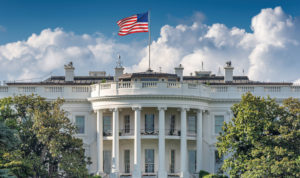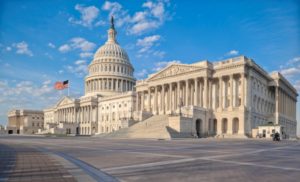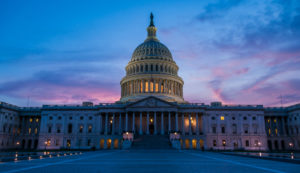
A recent Supreme Court decision challenges centuries of congressional regulatory authority over native nations.
The landmark 2020 U.S. Supreme Court decision in McGirt v. Oklahoma has seen no shortage of scholarly commentary and editorial reflection, due to the Court’s reaffirmation of some of the earliest principles of federal Indian law.
As it renewed the longstanding rules of treaty interpretation and clarified the legal test for reservation diminishment, the majority opinion also made an intriguing reference to the relationship between the U.S. Congress and Tribes.
The case involved a challenge by Jimcy McGirt, a citizen of the Seminole Nation of Oklahoma, who argued in post-conviction proceedings that the state of Oklahoma lacked jurisdiction to prosecute him for crimes he allegedly committed within the Muscogee Creek Nation. The general rule regarding jurisdiction over crimes committed in Indian Country is that states lack prosecutorial authority unless authorized by an act of Congress.
To determine whether McGirt’s crimes were committed in Indian Country, on Muscogee Creek lands, the Court had to answer a threshold question of whether these lands were still Creek lands, or whether the Creek Reservation had been lawfully diminished over time.
That, in turn, required the Court to examine the history of the federal government’s relationship with the Creek Nation, including Congress’s passage of the Major Crimes Act in 1885, establishing federal jurisdiction over certain crimes committed on tribal lands.
After examining this Act, the majority made an intriguing statement: “By subjecting Indians to federal trials for crimes committed on tribal lands, Congress may have breached its promises to Tribes like the Creek that they would be free to govern themselves.”
This statement is interesting when read in isolation, but when examined against the Court’s 150-year history of constitutional analysis of congressional delegations regarding Tribes, it becomes quite intriguing.
In very plain text, the U.S. Constitution contains two references to Indigenous peoples and Tribes. The first is in Article 1, Section 2, which excludes “Indians not taxed” from the enumeration of state residents for the purposes of apportionment of representatives in Congress. The second is the so-called Indian Commerce Clause, found in Article 1, Section 8, Clause 3, which confers authority on Congress to regulate interstate commerce and commerce “with the Indian Tribes.”
Those are the sole constitutional references regarding Indigenous peoples, and, although they are brief, they offer some hints about the Framers’ intent in drafting the Constitution.
As previous scholars have noted, these provisions can be interpreted as a reflection of the Framers’ understanding that Indigenous peoples were not citizens of states for purposes of apportionment and that Tribes were separate sovereign entities with which the federal government would be engaging in regulated commerce.
Yet, from these limited references, Congress has claimed general legislative authority over Indigenous peoples and Tribes dating back nearly 200 years. When Tribes have challenged these unilateral assumptions of regulatory authority, courts have nearly always deferred to Congress, citing the Indian Commerce Clause, alone or in combination with any number of circumstances that appear to justify federal regulation.
Congress has chosen to extend its legislative authority far beyond what the Constitution originally contemplated, into areas such as criminal jurisdiction, child welfare, and on-reservation gaming. Congress has also directly regulated tribal governmental structure and other internal affairs, tribal environmental quality, and the use, consumption, and conservation of natural resources by and affecting Indigenous peoples.
Congress undertook all of this regulation without a solid explanation—or examination—by the Supreme Court of its legal foundations, including the core question of whether it is constitutional for Congress to legislate regarding Indigenous peoples, the internal affairs of Tribes, and other matters affecting Indian Country and Indigenous lands.
The Supreme Court has sanctioned Congress’s ever encroaching legislative fervor under the dubiously established doctrine of federal plenary power. But whether this authority is constitutional is still hotly debated, more than 200 years after Congress first employed it. And if the exercise of congressional plenary power is unconstitutional, that raises serious questions about the constitutionality of congressional delegations authorizing the regulation of Indigenous peoples and Tribes.
The Supreme Court first examined the constitutionality of a delegation of authority from Congress to a Tribe in United States v. Mazurie, a 1974 case involving a federal liquor control statute. Under the framework the statute created, Tribes could seek approval from the Secretary of Interior and receive permission to enforce federal liquor control laws on tribal lands.
In the face of a constitutional challenge to this framework, the Supreme Court held that it was within Congress’s Indian Commerce Clause authority. Congressional delegations of authority to the executive branch over Indigenous peoples, Tribes, and Indian Country are more elusive, but they are also routinely upheld by the Supreme Court under the Indian Commerce Clause.
This history is what makes the Court’s recent statement in McGirt about Congress’s enactment of the Major Crimes Act—and its application within Creek Nation lands—so intriguing. If a majority of the Justices on the Supreme Court are finally willing to consider the constitutionality of a statute such as the Major Crimes Act—which has been federal law for 136 years—such review would raise a series of questions about the constitutionality of all congressional acts based on the Indian Commerce Clause.
Among these questions are whether the Court’s willingness to review such acts is conditioned upon treaty promises, including promises made to the Creek Nation, which were of great importance to the majority in McGirt.
It also may now be an open question whether it is inherently unconstitutional for Congress to pass legislation on matters unrelated to commerce with Tribes, regardless of prior treaties and the Supremacy Clause. An affirmative answer would render some legislation unconstitutional regardless of the form of the sovereign guarantee an individual Tribe had received in any prior treaty.
In addition, many of Congress’s delegation structures, such as the one at issue in Mazurie, contemplate a tribal assumption of regulatory authority only upon receiving permission from the U.S. Department of the Interior or another federal agency official—even as these delegation structures purport to recognize the inherent sovereign authority of Tribes to govern themselves.
Allowing this level of federal oversight does not seem consistent with the role that the Framers envisioned for Congress or the executive branch in the Constitution, nor is it consistent with federal promises made to so many Tribes, including the Creek Nation, that they would be forever “free to govern themselves.”
This essay is part of a series entitled Native Peoples, Tribal Sovereignty, and Regulation.




